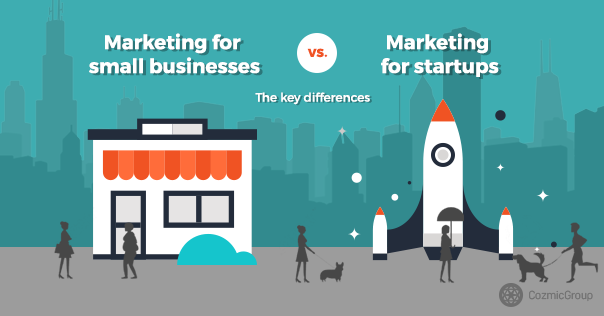One of the hardest things about marketing is to effectively differentiate between trends and good practices. While most professions deal with their share of trends, in the world of marketing they’ve become ubiquitous: the supposedly latest/hottest never fails to show up on our news feed pretty much every day, leading to a number of curious situations.
For example, when a trend grows strong enough for the word to spread around beyond the marketing forums, we sometimes get specific demands that not always relate to the solution a situation demands. Moreover, when a trend grows strong enough and becomes itself a new reality – in the form of an industry, a culture or both – things can get really confusing. This exactly is what happened with the startup scene and the reality of small businesses, and here comes the first big difference:
- Startups deal with much more pressure than small businesses. Startups, by definition, need to achieve a certain level of demand to exist. They may get by with external funding, but that’s a situation that won’t last forever. On the other hand, many small businesses have been there for a long time and rely on a well-established customer base to survive and thrive. In terms of marketing, startups tend to require higher investments and bolder strategies to reach their goals.
The startup ecosystem is an exciting thing see. First of all, it grew immense during the past decade, exceeding everyone’s expectations beyond imagination. A massive number of ideas came out of it: thousands became trends, and an important number of those proved themselves strong enough to outgrow that label. Marketing itself has seen the sprawling benefits of the startup culture, with thousands of new businesses investing in communication strategies, PR campaigns, and growing tactics. The new scenario also uncovered new problems that required new solutions:
- Startups are PR-intensive. A large number of startups work in advanced, complex and lesser-known fields. In this scenario, communication comes up as a top priority: if a startup fails to be clear about what it does and who it does it for, it simply fails. Small businesses, on the other hand, often aim at more stable scenarios and in terms of communication, give more room to creativity.
Given the similarities that exist between startups and small businesses, we started getting weird requests from both sides. Things is, startups and small businesses may look alike, but they’re not the same. Ultimately, there are differences that make them very different entities. So where does this leave us?
- Startups are where good practices come to die. You’ve seen it before. The startup with the cool kids wearing custom t-shirts and trying to push its message all over the place. This is actually a good practice if you’re a player in the catering business, but if you’re into the tailor-made embedding software biz, it’s a total waste of time and money. Startups try to be unique, and that’s a good thing; however, if you want to be unique, expect unique communication problems as well.
In short, small businesses usually relate to what works. A marketer will know how to kickstart a good marketing campaign for a small business – basically because we’ve been there before. Startups require a different approach – one that sustains and proves that any given startup is actually different from everyone else.

